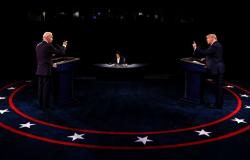Lawyers for former President Trump argued at a hearing Thursday that the charges he faces in Georgia target core political speech and urged the judge to dismiss them under the First Amendment before the case heads to trial.
Trump attorney Steve Sadow asserted that statements linked to campaigns and elections have always been found to be at the “zenith of protected speech.”
“But for protected First Amendment speech, President Trump would not be charged in RICO or the other counts,” Sadow said.
“Take out the protected speech, and you don’t have an underlying basis for which to charge him,” he continued. “And since that violates the Constitution as applied to the charges here, and his speech here and his position here, this is ripe for a constitutional challenge.”
Trump contested the November 2020 election he lost to Joe Biden through a wide swath of legal challenges but also a number of speeches starting on election night in which he would not accept the results that projected President Biden’s eventual victory.
Trump falsely ascertained the election was “stolen” and “rigged” against him. No evidence of mass fraud was ever found by officials.
That included in the state of Georgia, where lawyers and political allies embarked on a campaign to overturn the election results, including a phone call in which Trump pressured Georgia Secretary of State Brad Raffensperger (R) to “find” an exact number of votes in order for Trump to win.
Trump faces 10 charges in Georgia, but Judge Scott McAfee dismissed three counts against him due to a lack of detail earlier this month. He and a dozen allies are accused of attempting to subvert the state’s election results to keep Trump in power. Trump has pleaded not guilty.
Thursday marked the first hearing in the case since McAfee found Fulton County District Attorney Fani Willis’s (D) once-romantic relationship with Nathan Wade, a top prosecutor on the case, created an appearance of a conflict of interest. The judge allowed Willis to proceed once Wade resigned, rejecting the defense’s request to toss the historic indictment.
As Trump prepares to appeal that ruling, McAfee indicated he will continue moving ahead with resolving the remaining pretrial matters.
Sadow urged the judge to make a determination on the First Amendment issue imminently, although the judge suggested a more appropriate time might be during the trial, when defense counsel would ask for a directed verdict in their favor.
“Do we go through the whole trial — God forbid, there should be a conviction — and then we go back to try and determine as applied?” Sadow said. “I’m suggesting the reason it’s right now, and the reason why we don’t even get to a trial, is because it’s unconstitutional [for] an accused — be it the president of the United States, former president or anyone else — to stand trial on protected speech.”
Beyond Trump’s First Amendment defense, McAfee also heard Thursday from an attorney for David Shafer, the former Georgia Republican Party chair, who asserts various deficiencies with his charges.
Shafer is charged over his alleged involvement in the scheme to send an alternate slate of electors purporting Trump won Georgia in 2020. Shafer faces counts including forgery and impersonating a public officer.
Craig Gillen, Shafer’s attorney, pushed back on the notion of describing Shafer as a “fake elector.” Among other arguments, Gillen urged the judge to dismiss some of the charges or remove language from the indictment characterizing Shafer’s Electoral College documents as “false” votes while describing the Biden electors as “lawful.”
“There’s no place for it in what they have done not only in the indictment, but in their pleadings and statements they’ve made outside to the media,” Gillen said.
“What they have tried to do is they want to have ingrained in the minds of the community and of jurors, a concept that if you are not a Democratic elector on December the 14th, casting your vote at some other part of the State Capitol, then you are a fake elector,” Gillen continued. “And that is a pejorative term not necessary for the charges and should be struck.”
“Nowhere in this indictment is the phrase ‘fake elector’ — it does not exist,” Fulton County prosecutor Will Wooten said. “Literally not in the indictment. So, I’m not really sure what we’re talking about, removing something from the indictment that’s not there.”
In the indictment, prosecutors described Shafer and others as “Trump presidential elector nominees” who cast “false” votes.
Neither Shafer nor Trump were present in the courtroom Thursday. The former president has yet to attend a hearing in his Georgia case, while Shafer has shown up for multiple previous proceedings.
McAfee did not rule on any motions during Thursday’s hearing.
Updated at 12:50 p.m. EDT
Copyright 2024 Nexstar Media Inc. All rights reserved. This material may not be published, broadcast, rewritten, or redistributed.
Tags: Trump attorney argues Georgia charges target core political speech
-





